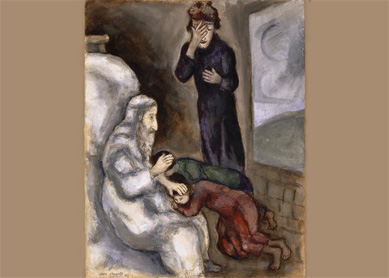Sibling rivalry is a fact of life. Brothers and sisters are always competing in one way or another. But this rivalry can be taken too far. When Hamlet’s uncle Claudius murders his own brother in order to become king, he confesses:
Oh, my offence is rank.
It smells to heaven.
It hath the primal eldest curse upon’t,
A brother’s murder.
(William Shakespeare, Hamlet, Act 3, Scene 3)
The “primal eldest curse” is, of course, the biblical curse of Adam and Eve’s Cain, who slew his brother Abel.
Why did Cain murder Abel?
In the biblical story, Cain has several motives for murdering his brother Abel. The most obvious motive is jealousy that God accepted Abel’s offering over Cain’s. But this is more than simple envy: As the firstborn son, Cain holds legitimate authority over his younger brother. The description of the brothers’ sacrifices hints at the primacy of the firstborn:
In the course of time Cain brought to the Lord an offering of the fruit of the ground, and Abel for his part brought of the firstlings of his flock, their fat portions. And the Lord had regard for Abel and his offering, but for Cain and his offering he had no regard. (Gen 4:3-5)
The word “firstlings” characterizes Abel’s sacrifice but not Cain’s. Still, Cain himself is the family’s firstborn son, offering his sacrifice first. And by the normal rule of family authority, his sacrifice should be accepted first. But it isn’t—God defies expectations and accepts only the youngest son’s offering. Notice the stylistic variation in the order of the brothers in this passage: “Cain…Abel…Abel…Cain.” The order of the brothers is as expected when the sacrifices are offered, but it is reversed when God responds. Both in style and in content, in God’s regard, Abel comes first—and Cain comes last. The normal hierarchy of the firstborn and younger child is turned upside down.
This reversal—the ascent of the youngest—is a frequent motif in the Bible, particularly in Genesis, where the younger child is consistently raised above his or her siblings: Isaac over Ishmael, Jacob over Esau, Rachel over Leah, Joseph over his brothers, and Ephraim over Manasseh. The ascent of David over his brothers is a later repetition of this same motif. God’s preference of Abel’s offering over Cain’s is simply the first in this series, but Cain’s response makes it the deadliest.
Why does Cain evade God’s question?
This inversion of roles adds depth to Cain’s response when God asks, after the murder, “Where is your brother Abel?” Cain replies, “I do not know; am I my brother’s keeper?” (Gen 4:9). There are many ironies here. For one, Cain does know where Abel is—he murdered him. And more importantly, as the older brother, Cain is indeed supposed to be his brother’s keeper (literally “one who guards, protects”). The firstborn son has authority and responsibility for his younger brothers.
This is why Reuben, Jacob’s firstborn son, convinces his brothers not to murder their younger brother Joseph. He urges, “Let us not take his life….Shed no blood” (Gen 37:21-22). But Cain rejects the obligation to care for Abel; instead, he takes his life. And it is Abel’s blood, shed in violence, that calls out to God and implicates the murderer. Cain’s brazen lie (“I do not know”) is erased by the voice of his brother’s blood. God replies to Cain: “What have you done? Listen; your brother’s blood is crying out to me from the ground!” By the inexorable logic of this discovery, God curses Cain “from the ground, which has opened its mouth to receive your brother’s blood from your hand” (Gen 4:11).
Cain, who brought his sacrifice “from the fruit of the ground” and has shed his brother’s blood on the soil, is now himself cursed “from the ground.” No longer a farmer, he becomes a wanderer, exiled from the fruitful soil and dwelling in the Land of Nod (literally “wandering”). Having lost his family, his livelihood, and his home, he now dwells outside of civilization, a rootless vagabond. Where he wanders there is no law or morality. So he complains to God: “Anyone who meets me may kill me” (Gen 4:14). This would be an apt punishment for a murderer. But God has compassion for Cain and gives him a mark so that no one will kill him. Cain will live on, but his existence is only a shadow of his former life.
Abel’s death holds one final nuance. The name Abel (Hebrew, hebel) literally means “breath, evanescence, impermanence.” The child himself is Mr. Evanescent. By his very name, he is doomed to a short and uneventful life. This does not lighten Cain’s guilt, but it suggests a deeper layer of meaning. In one sense, we are all Abel, destined for evanescence and death. But we are also like Cain, subject to anger and sinful impulses. As God warns, “sin is lurking at the door; its desire is for you, but you must master it” (Gen 4:7). We are each the Cain of our own conscience, morally responsible for our deeds. We are, the story seems to say, the spiritual descendants of both brothers—caught up in life’s moral problematics, forever dwelling somewhere “east of Eden” (Gen 4:16).




